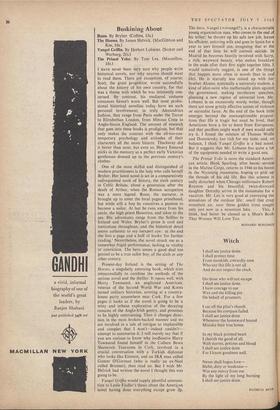Buskining About
Roan. By Bryher. (Collins, 15s.)
I HAVE never been very sure why people write historical novels, nor why anyone should want to read them. There are exceptions, of course; Scott, the great progenitor, wrote successfully about the history of his own country, for that was a theme with which he was intimately con- cerned. By contrast, his medieval costume romances haven't worn well. But most profes- sional historical novelists today have no such personal involvement; in truly Alexandrian fashion, they range from Paris under the Terror to Elizabethan London, from Minoan Crete to Anglo-Saxon England. The amount of research that goes into these books is prodigious, but that only makes the contrast with the all-too-con- temporary psychology and attitudes of their characters all the more bizarre. Thackeray did it better than most, but even so, Henry Esmond sticks in the memory as a perfect early Victorian gentleman dressed up in the previous century's clothes.
One of the most skilful and distinguished of modern practitioners is the lady who calls herself Bryher. Her latest novel is set in a comparatively unfrequented nook of history, the sixth century in Celtic Britain, about a generation after the death of Arthur, when the Roman occupation was a mere legend. Ruan, the narrator, is brought up to enter the local pagan priesthood, but while still a boy he conceives a passion to become a sailor. At last he runs away from his uncle, the high priest Honorius, and takes to the sea. His adventures range from the Scillies to Ireland and Wales. Bryher's prose is cool and meticulous throughout, and the historical detail seems authentic to my inexpert eye : at the end she lists a page and a half of books 'for further reading.' Nevertheless, the novel struck me as a somewhat frigid performance, lacking in vitality or conviction. The hero seems a good deal too genteel to be a true sailor boy, of the sixth or any other century.
Present-day Ireland is the setting of The Horses, a singularly annoying book, which tries unsuccessfully to combine the methods of the serious novel and the thriller. It opens well, with Harry Townsend, an anglicised American, veteran of the Second World War and Korea turned military historian, arriving at a country- house party somewhere near Cork. For a few pages it looks as if the novel is going to be a witty and urbane exploration of the decaying remains of the Anglo-Irish gentry, and promises to be highly entertaining. Then it changes direc- tion in the most broken-backed manner and we are involved in a tale of intrigue so implausible and complex that I won't----indeed couldn't— attempt to summarise it. I will merely say that if you are curious to know why inoffensive Harry Townsend found himself in the Colleen Bawn Shamrock Tearooms in Cork, involved in a crucial conversation with a Turkish diplomat who looks like Einstein, and an IRA man called Gunter O'Gorman (who is really an ex-Nazi called Brunner), then read on. But I wish Mr. Helvick had written the novel I thought this was going to be.
Vangel Griffin would supply plentiful ammuni- tion to Leslie Fiedler's thesis about the American novel having done everything except grow–iip.
The hero, Vangel (=evangel?), is a characteristic young organisation man, who comes to the end of his tether; he throws up his safe law job, leaves his efficient, unloving wife and goes to Spain for a year to sort himself out, imagining that at the end of that time he will commit suicide. In Madrid he becomes heavily involved with Satry a rich, wayward beauty, who makes breakfast in the nude after their first night together (this, I would tentatively suggest, is one of the things that happen more often in novels than in real life). He is scarcely less mixed up with her brother Alonso, nominally a university student, a kind of idiot-saint who ineffectually plots against the government, making incoherent speeches planning a new regime of universal love. Mr Lobsenz is an excessively wordy writer, though there are some grimly effective scenes of violence or surrealist farce. At the end of the book Halt emerges beyond the unexceptionable proposi. tions that life is tragic but must be lived, that Americans have a lot to learn from Europeans and that pacifism might work if men would only try it. I found the mixture of Thomas Wolfe and Dostoievsky too rich for my taste, and, or balance, I think Vangel Griffin is a bad novel But it suggests that Mr. Lobsenz has quite a lol of the equipment needed to write a good one.
The Primal Yoke is more the standard Ameri- can article. Hank Spurling, after heroic service in the Marine Corps, returns in 1946 to his home in the Wyoming mountains, hoping to pick up the threads of his old life. But this scheme is sadly disturbed when Chicago millionaire Robert Royston and his beautiful, twice-divorced daughter Dorothy arrive in the mountains for a vacation. Mr. Lea is very good at conveying the sensations of the outdoor life: smell that crisp mountain air, taste those golden trout caught only just now in a mountain lake. . . . This, I think, had better be classed as a Man's Book
That Women Will Love Too. •
BERNARD BERGON2,1


























































 Previous page
Previous page